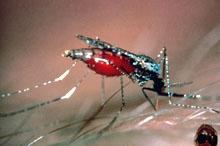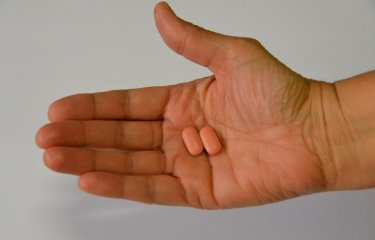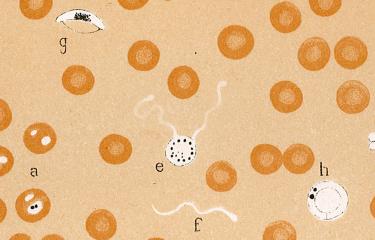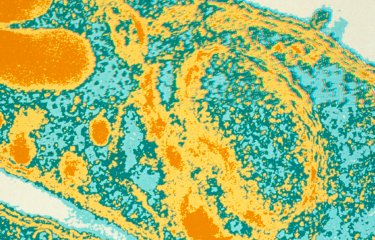A large-scale evolutionary and epidemiological genetic study carried out over an eight-year period in Thailand has enabled Institut Pasteur and CNRS researchers to demonstrate that a mutation that is particularly widespread in some South-East Asian populations offers a higher level of resistance to malaria. This research, published in the December 11 issue of the journal Science, also reveals that this beneficial mutation emerged 1500 years ago and significantly boosted the survival rate of these populations.
Press release
Paris, december 11, 2009

The researchers particularly demonstrated a correlation between the mutation and a lower parasite load of Plasmodium vivax, the primary malaria agent in South-East Asia, responsible for half of all malaria cases in the region. In addition to typical malaria symptoms, this parasite is implicated in causing very low birth weight, a risk factor for all cause perinatal mortality; it therefore has alarming repercussions for the health and survival of young children and babies.
The mutation identified by researchers as having a protective effect, named G6PD-Mahidol487A, affects the gene of the G6PD enzyme. A deficiency in this enzyme has been known for a long time to cause favism, following the ingestion of fava beans and other “oxidative” foods ", with subsequent pathologies of varying degrees of severity, including jaundice and anemia. The G6PD-Mahidol487A mutation is particularly frequent in South-East Asia, where it is carried by 18 to 25% of the population. In revealing its protective effect against Plasmodium vivax, the study therefore explains why this mutation, which has the above-mentioned deleterious consequences, has been able to reach such high levels in this region of the world. Previous research conducted in Africa demonstrated that another mutation affecting the same gene offered resistance to Plasmodium falciparum, the main malaria agent on that continent. But the current study is the first to show a direct link between a mutation affecting the G6PD gene and malaria caused by Plasmodium vivax.
Finally, the study enabled researchers to date the emergence of the G6PD-Mahidol487A beneficial mutation in the human genome. It first occurred 1500 years ago in South-East Asia, coinciding with the expansion of rice cultivation, which required extensive deforestation and therefore brought humans and mosquitoes, vectors of malaria, into closer contact. Given this increased "infectious pressure" due to a greater exposure to mosquitoes, those who carried the G6PD-Mahidol487A mutation had an advantage, and more were able to survive.
Source
Positively selected G6PD-Mahidol mutation reduces Plasmodium vivax density in South-East Asians, Science, December 11, 2009.
Chalisa Louicharoen,1,2* Etienne Patin,3*† Richard Paul,1 Issarang Nuchprayoon,4 Bhee Witoonpanich,1 Chayanon Peerapittayamongkol,1‡ Isabelle Casademont,1 Thanyachai Sura,5 Nan M. Laird,6 Pratap Singhasivanon,7 Lluis Quintana-Murci,3§ Anavaj Sakuntabhai1,5§
1. Institut Pasteur, Laboratory of Human Genetics of Infectious Diseases, Paris, France.
2. Inter-Department Program of Biomedical Science, Faculty of Graduate School, Chulalongkorn University, Bangkok, Thailand.
3. Institut Pasteur, Human Evolutionary Genetics Unit, CNRS, URA3012, Paris, France.
4. Department of Pediatrics, Faculty of Medicine, Chulalongkorn University, Bangkok, Thailand.
5. Department of Medicine, Faculty of Medicine Ramathibodi Hospital, Mahidol University, Bangkok, Thailand.
6. Department of Biostatistics, Harvard School of Public Health, 655 Huntington Avenue, Boston, MA, USA.
7. Department of Tropical Hygiene, Faculty of Tropical Medicine, Mahidol University, Bangkok, Thailand.
*These authors contributed equally to this work.
†Present address: Laboratory of Human Genetics of Infectious Diseases, Necker Branch, INSERM, U550, Necker Medical School, Paris, France
‡Present address: Department of Biochemistry, Faculty of Medicine Siriraj Hospital, Mahidol University, Bangkok, Thailand
Contacts
Institut Pasteur Press Office
Marion Doucet : +33 (0)1 45 68 89 28 – marion.doucet@pasteur.fr
Tuline Clément : +33 (0)1 40 61 33 41 – tuline.clement@pasteur.fr
CNRS Press Office
Elsa Champion : +33 (0)1 44 96 43 09 – elsa.champion@cnrs-dir.fr





